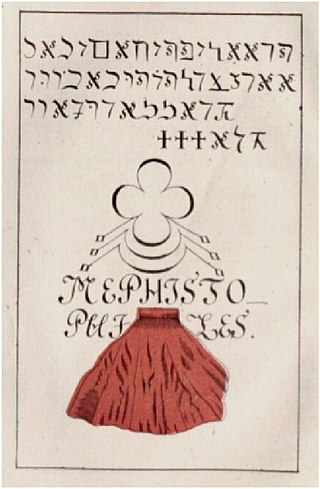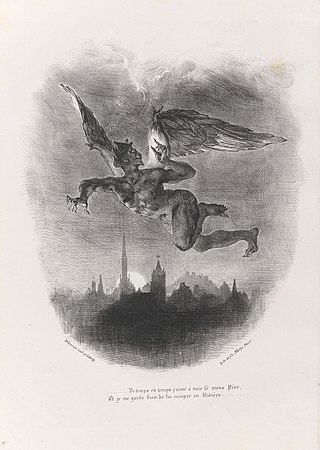Mephistopheles
Demon in German folklore From Wikipedia, the free encyclopedia
Mephistopheles[a] (/ˌmɛfɪˈstɒfɪliːz/ MEF-ist-OF-il-eez, German: [mefɪˈstoːfəlɛs] ⓘ), also known as Mephostophilis[1] or Mephisto,[2] is a demon featured in German folklore, and as the chief devil in the Faust legend.[3] He originally appeared in literature as the demon in the Faust legend and has since become a stock character appearing in other works of arts and popular culture. Mephistopheles is known for being invented in the historical story of Johann Georg Faust. Mephistopheles never became an integral part of traditional magic.[4] He is also referred to as the Shadow of Lucifer and Prince of Trickery.

During the medieval and Renaissance times, Mephistopheles is equated with the devil due to his high position in the hellish hierarchy. He is one of the seven great princes of Hell, along with being one of the first four angels who rebelled against God and fell. [5] Though, due to the different roles of Mephisotpheles, there is not a set appearance of what he looks like. He appears mostly ambiguous.
Origins
Summarize
Perspective
Around the fifteenth to seventeenth centuries, the age of witchcraft passed. During this time, the Devil became more of an occurrence in literature until the later eighteenth century. Once the idea of Satan's "metaphysical existence" was not much thought of, he later became a symbol in much literature as evil characters, evil meanings, corruptions, etc. [6]Though there was an occurrence that appeared of sympathy, which was called the Romantic Devil. Those who believe in pantheistic mysticism— the belief that an individual experiences a mystical union with the divine, believing that God and the universe are one—believed that the reason the angels fell from heaven was due to a love of beauty and wanting to have it for themselves. [7] This idea lead to the Enlightenment and Romantiscism piece of Faust literature by Johann Wolfgang von Goethe (1749-1832), in which he created his version of the Devil, Mephistopheles. Goethe's Mephistopheles is known as one of the most influential literary creations. [8] Goethe wrote Faust during Enlightenment, which went against the church due to his creation of Mephistopheles, which later became known as the Christian Devil.[9]

Devil vs. Mephistopheles
Johann Wolfgang Von Goethe decided to dive into the cosmology and was able to produce the three, the God, the Son, and the Holy Spirit, together, so when there was a fourth, Lucifer.
Etymology and Name Meaning
The name Mephistopheles is a corrupted Greek compound.[10] The Greek particle of negation (μή, mē) and the Greek word for "love" or "loving" (φίλος, philos) are the first and last terms of the compound, but the middle term is more doubtful.
Three possible meanings have been proposed, and three different etymologies have been offered:
- "not loving light" (φῶς, phōs; the old form of the name being Mephostopheles)
- "not loving Faust"
- mephitic, pertaining to poisonous vapors arising from pools, caverns, and springs.[10]
Mephistopheles' name was possibly taken from Hebrew words where "mephiz" is deemed as a destroyer and "tophel" is seen as slander. Mephistopheles has different perspectives depending on the writer. Overall, he was seen as a cruel demon who was mischievous and cunning. He primarily fed on the sufferings of people and loved to spread lies.[11]The name was invented for the historical alchemist Johann Georg Faust by the anonymous author of the first Faustbuch (published 1587).[2] Mephisotpheles was never a part of the traditional magic and demonology. In the play, Doctor Faustus (1604), created by Christopher Marlowe, Mephistopheles was written as a fallen angel rather than a familiar. In the drama, Faust, written in two parts, by J.W. von Goethe, was portrayed as cold-hearted, humorous, and ironic.
In the Faust legend
Summarize
Perspective

Mephistopheles is associated with the Faust legend of an ambitious scholar, based on the historical Johann Georg Faust. In the legend, Faust makes a deal with the Devil at the price of his soul, Mephistopheles acting as the devil's agent.
The name appears in the late-sixteenth-century Faust chapbooks – stories concerning the life of Johann Georg Faust, written by an anonymous German author.
In the 1725 version, which Goethe read, Mephostophiles is a devil in the form of a greyfriar summoned by Faust in a wood outside Wittenberg.
From the chapbooks, the name entered Faustian literature. Many authors have used it, from Goethe to Christopher Marlowe. In the 1616 edition of Marlowe's The Tragical History of Doctor Faustus, Mephostophiles became Mephistophilis.
Mephistopheles in later treatments of the Faust material frequently figures as a title character: in Meyer Lutz's Mephistopheles, or Faust and Marguerite (1855), Arrigo Boito's Mefistofele (1868), Klaus Mann's Mephisto, and Franz Liszt's Mephisto Waltzes. There are also many parallels with the character of Mephistopheles and the character Lord Henry Wotton in The Picture of Dorian Gray by Oscar Wilde.[12]
Mephistopheles in Performance
Summarize
Perspective
Goethe's Faust

In Goethe's Faust, the role of Mephistopheles is quite complex, and Josef Kainz describes the role as one of the most significant challenges for an actor in world theater. The character constantly changes in tone throughout the play, giving the character a feeling of minor to no consistency in performance on stage. When Mephisto first meets Faust, he describes how his spirit being “Nothing” conflicts with the world’s spirit of “Something” (Part I Scene III, 1362-1366). The devil is in constant conflict with the world he is placed into, which explains the fluctuation of roles Mephisto portrays on the stage or screen. For an actor to play Goethe's Mephisto, they are called upon to embody this “Nothing” and disconnect themselves from the “Something” that makes them earthly. To achieve this characterization, actors are encouraged to be dramatic and rough in tone and gestures, contradicting traditional elements of classical theater. [13]
Marlowe's Dr. Faustus
In Marlowe's Doctor Faustus, the roles of Dr. Faustus and Mephistopheles between the two actors, Sandy Grierson and Oliver Ryan, in 2016. While playing both roles, the Scottish actor, Sandy Grierson, expressed that Mephistopheles is more humane than what is portrayed in other plays and novels. [14] The character correlates to the idea of humanity when Mephistopheles pleads with Faustus to reconsider his deal. "O Faustus, leave these frivolous demands" (Act II, Scene 1). Mephistopheles portrays a sense of feeling to prevent Dr. Faustus from making the incorrect decision. Concluding that Mephistopheles is portrayed as less condescending and cold-hearted. Arthur Darvill, who plays as Rory Williams, a companion of the Eleventh Doctor in the television series Doctor Who, even played as Mephistopheles in the 2011 Shakespeare's Globe Theatre's production of Doctor Faustus, expressed how thrilling his experince was on Shakespeare's Globe Youtube Channel. [15]

Interpretations
Summarize
Perspective

Devil, Damnation, and Hell
Although Mephistopheles appears to Faustus as a demon – a worker for Lucifer – critics claim that he does not search for men to corrupt, but comes to serve and ultimately collect the souls of those who are already damned. Willard Farnham explains, "Nor does Mephistophiles first appear to Faustus as a devil who walks up and down on earth to tempt and corrupt any man encountered. He appears because he senses in Faustus' magical summons that Faustus is already corrupt, that indeed he is already 'in danger to be damned'."[16]
Mephistopheles is already trapped in his own Hell by serving the Devil. He warns Faustus of the choice he is making by "selling his soul" to the devil: "Mephistophilis, an agent of Lucifer, appears and at first advises Faust not to forego the promise of heaven to pursue his goals".[17] Farnham adds to his theory, "...[Faustus] enters an ever-present private hell like that of Mephistophiles".[18]

Dorothy L. Sayers' play, The Devil to Pay, published in 1939, portrays Mephistopheles as a familiar of the devil as well. Though Sayers created Mephistopheles to seem mischievous and daunting, while doing the devil's bidding. In this play, it appears as if Mephistopheles' actions were willingly. Mephistopheles did not necessarily warn Dr. Faustus; rather, he persuaded him to believe that he was to be his servant instead. Once Dr. Faustus was gone, Mephistopheles called into the Hell-Mouth, "Lucifer, Lucifer! The bird is caught..."[Mephistopheles].[19]
Nature vs. Evil
The nature between God and evil is complex amongst the theological issues. In Christianity and Judaism, God is inherently deemed as good and not capable of being evil, though those religions also have to acknowledge the existence of evil in the world. Through the ideals of the Society of Jesuits, the Roman Catholic religious order expressed that nature is undistorted by original sin.[20] Mephistopheles is also appears as a nature spirit, a Naturgeist.[21] Though he is still deemed as evil or rather destructive amongst many scholars. Mephisto appears as the opponent of God and the instrument of the divine wall. Mephisto plays the principal of the spirit. Specifically for evil vs good, chaos against order, etc. Mephistopheles is a nature spirit representing the unsegmented world through the human experience. [22]
Sexuality
One interpretation of the character is that Mephistopheles presents himself as a sexual voyeur. This voyeurism can represent Faust’s sexual confusion and temptation. An example would be Faust’s interactions with Helen of Troy, in which, given temptation, Mephistopheles loosens his grip on Faust as he falls further from God and Heaven. [13]
See also
- Beelzebub
- Devil in Christianity
- Prince of Darkness
- Satan
- Mephiskapheles, Ska band whose name is a play on Mephistopheles
- Mr. Mistoffelees, a character from the musical Cats
- Servant, television series
- Mephisto (Marvel Comics) a character from Marvel Comics based on the Demon.
- William Shakespeare mentions "Mephistophilus" in The Merry Wives of Windsor (Act I, Scene I, line 128), and by the 17th century the name became independent of the Faust legend.[23]
Notes
References
Bibliography
External links
Wikiwand - on
Seamless Wikipedia browsing. On steroids.
